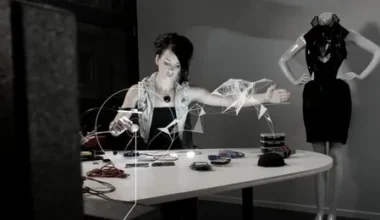At the center of India’s rapidly growing fashion sector is the renowned National Institute of Fashion Technology, also referred to as NIFT. Under the direction of the Government of India’s Ministry of Textiles, NIFT was founded in 1986 and has since developed into a preeminent educational establishment that sets standards for professional growth, research, and fashion education.
History and Mission
The inception of NIFT dates back to the early 1980s, a time when professional training and formal education were missing in India’s developing fashion industry. The Indian government knew it needed to develop talent and raise the bar for the fashion business, so it created NIFT.
NIFT’s purpose is to educate students to the highest standards in fashion and allied fields while promoting their creativity, innovation, and greatness. The institute works to preserve India’s rich textile legacy while developing people who can make significant contributions to the global fashion scene.
Academic Programs
A wide variety of undergraduate and graduate degrees are available at NIFT, all designed to satisfy the needs of the ever-evolving fashion industry. These programs cover a wide range of subjects, including management, textile design, fashion communication, fashion design, fashion technology, and apparel production.
The curriculum at NIFT is carefully designed to combine theory with real-world experience, giving students the abilities, perspectives, and exposure to business that they need to succeed in their chosen industries. In order to give students practical knowledge and networking possibilities, the institute also works with top fashion houses, designers, and industry professionals.
Infrastructure and Facilities
Modern facilities and infrastructure support comprehensive learning and creative expression at all of the NIFT campuses in India. NIFT makes sure that students have access to the newest tools, technology, and resources to assist their academic endeavors through well-equipped design studios, laboratories, large libraries, and resource centers.
In addition, NIFT campuses organize a wide range of workshops, seminars, fashion displays, and cultural events that promote a dynamic and cooperative learning environment. These extracurricular activities give students a platform to showcase their talents to the larger community in addition to improving their creative and interpersonal skills.
Industry Collaborations and Placements
NIFT has strong partnerships with top fashion labels, trade associations, and academic institutions across the globe. These agreements enable the creation of industry-relevant curricula, faculty exchange programs, joint research projects, and internships, all of which improve students’ educational opportunities and career prospects.
Moreover, NIFT has a strong placement record, with prominent fashion houses, retail chains, design studios, and global organizations actively seeking to hire its graduates. National institute of fashion technology graduates are well-positioned to start lucrative careers in the fashion sector because to the institute’s extensive industry connections and global alumni network.
Research and Innovation
Apart from its scholarly pursuits, National institute of fashion technology is dedicated to promoting investigation and originality within the domain of apparel and textiles. The institute is home to specialized labs and research institutes devoted to investigating cutting-edge technologies, environmentally friendly methods, traditional handicrafts, and cultural heritage.
NIFT strives to solve current issues facing the fashion industry while promoting innovation and sustainability through multidisciplinary research projects, cooperative efforts, and industry partnerships. NIFT hopes to influence the direction of fashion in India and abroad by fostering an environment that encourages research and innovation.
Is NIFT a private or government university?
The National Institute of Fashion Technology, or NIFT, is an organization under government control. It was founded in 1986 under the auspices of the Indian government’s Ministry of Textiles. Being a government institution, NIFT is supported and funded by the Indian government and is subject to the rules and directives that are established by those in charge.
How can I get admission in NIFT?
A stringent selection process is the foundation for the extremely tough admissions to the National Institute of Fashion Technology (NIFT). An outline of the procedures normally involved in gaining admission to NIFT is provided below:
Entrance Exam
- The National institute of fashion technology entrance exam is the initial step, and the institute conducts it every year.
- The test evaluates a candidate’s aptitude, logical thinking, creative abilities, and industry knowledge.
- Depending on the discipline and program level (undergraduate or postgraduate), the exam format may change.
Application Process
- Applicants must use the NIFT official website to complete the online application for the NIFT entrance exam.
- Personal information, educational background, preferred program/discipline, and other pertinent data are usually included in the application form.
- It can also be necessary for candidates to provide scanned copies of their academic transcripts, diplomas, and photos.
Admit Card
- Candidates receive an admit card with information about the exam date, time, and center after completing the application process.
- On the day of the exam, you must bring the admit card to the testing location.
Entrance Exam
- It is required of candidates to show up at the assigned exam center for the National institute of fashion technology entrance exam.
- Depending on the program and field, the exam may include multiple-choice questions, creative aptitude tests, group discussions, and personal interviews.
Declaration of Results

- The admission exam results are released by National institute of fashion technology on its official website.
- On the website, candidates can obtain their scorecards and review their results.
Counseling and Seat Allocation
- Candidates who have been shortlisted are invited to take part in NIFT’s counseling procedure.
- Candidates receive seat assignments during counseling based on their admission exam results, program preference, and seat availability.
- Candidates must bring the required paperwork for validation to the counseling session in person.
Final Admission
- After seat allocation, candidates need to complete the admission formalities, including payment of fees and submission of required documents.
- Following the admissions process, candidates are formally enrolled in NIFT’s selected program.
Candidates are urged to often check the official National institute of fashion technology website for changes and instructions about the admission procedure, as the particular prerequisites and information may change annually. Before submitting an application for admission, aspirants should also carefully read the qualifying requirements and admission rules supplied by NIFT.
Which courses are offered in NIFT?
wide variety of undergraduate and graduate programs in fields including fashion, design, textiles, and garment management are available at National institute of fashion technology. An outline of the courses that National institute of fashion technology normally offers is provided below:
Undergraduate Programs
Bachelor of Design (B.Des.):
- Fashion Design
- Leather Design
- Accessory Design
- Textile Design
- Knitwear Design
- Fashion Communication
Bachelor of Fashion Technology (B.F.Tech.)
- Apparel Production
Postgraduate Programs
Master of Design (M.Des.)
- Fashion Design
- Fashion Management
- Knitwear Design
- Textile Design
Master of Fashion Management (M.F.M.)
Master of Fashion Technology (M.F.Tech.):
- Apparel Production and Management
- Fashion Technology
Integrated Programs
Integrated Master of Design (M.Des.):
- Fashion Design
Integrated Master of Fashion Management (M.F.M.)
The particular programs available may differ throughout National institute of fashion technology campuses. Additionally, depending on market trends, technology developments, and educational requirements, NIFT may launch new programs or alter current ones. Prospective students seeking the most recent details on available courses and admissions procedures are urged to visit the official NIFT website or get in touch with the institute directly.
Is NIFT worth the money?
NIFT’s value as an investment depends on a number of variables, such as personal ambitions, professional objectives, budgetary constraints, and the caliber of possibilities and instruction the school offers. When assessing the worth of NIFT, keep the following things in mind:
Reputation and Accreditation
One of India’s top fashion schools, National institute of fashion technology is well-known for its outstanding academic programs, strong industry ties, and successful alumni. Its accreditation and connection to the Indian government’s Ministry of Textiles give its programs legitimacy.
Quality of Education
Modern facilities, extensive and industry-relevant courses, and knowledgeable instructors who offer practical instruction and exposure to a range of fashion industry aspects are all provided by National institute of fashion technology. The institute places a strong emphasis on praxis, ingenuity, and creativity—all essential for success in the fashion industry.
Industry Exposure and Placements
Strong industry partnerships and placement chances are provided by National institute of fashion technology, as top fashion labels, design studios, and businesses actively seek out its graduates. Opportunities for internships, job placements, and career growth are facilitated by the institute’s robust network and the presence of its alumni in the fashion industry.
Cost vs. Return on Investment
Attending NIFT requires financial investment in the form of tuition fees, living expenses, and other associated charges, just like attending any other educational school. In order to determine whether attending school will benefit them financially, professionally, and personally, prospective students should consider the pros and cons of working in the fashion industry.
Personal and Professional Development:
NIFT fosters creativity, critical thinking, teamwork, and leadership qualities in an environment that is favorable to both professional and personal growth. The institute’s focus on comprehensive development equips students for leadership positions in adjacent industries and entrepreneurial endeavors in addition to fashion employment.
Do NIFT students get paid?
Generally speaking, National institute of fashion technology students are not compensated for their academic endeavors or attendance at the institute. Rather, students pay tuition to become a part of NIFT’s courses. However, during their studies or after graduation, NIFT students might be able to find paid internships, part-time jobs, or freelance work.
- Internships: A lot of businesses, retail brands, fashion firms, and design studios provide National institute of fashion technology students with internships as extracurricular activities or as part of their curriculum. Depending on the employing organization’s policies and the type of internship, these positions may be paid or unpaid.
- Part-time Jobs: Some NIFT students may choose to take up part-time jobs to support themselves financially while studying. These positions could be in retail, fashion shows, tutoring, or other relevant professions as independent contractors in the design industry.
What is the admission fee of NIFT?
Detailed price list for NIFT courses in 2023. Based on the data you provide, the total cost of each course is broken down as follows:
B.Des (Bachelor of Design)
- Duration: 4 years
- Amount Payable: INR 10,17,800
B.F. Tech (Bachelor of Fashion Technology)
- Duration: 4 years
- Amount Payable: INR 10,17,800
MFM (Master of Fashion Management)
- Duration: 2 years
- Amount Payable: INR 4,10,800
M.F. Tech (Master of Fashion Technology)
- Duration: 2 years
- Amount Payable: INR 4,10,800
These amounts show the total amount of fees that must be paid for each course over its whole term. It’s crucial to remember that the costs listed above are for the academic year 2023 and can vary in the years that follow. When creating a budget for their time at NIFT, students should also account for additional costs like housing, living expenditures, study materials, and personal expenses.
Is it difficult to get admission in NIFT?
Because of NIFT’s esteemed reputation and the great demand for top-notch fashion and design education, admission to the school can be hard. An admission exam is usually combined with a portfolio review, group discussion, and in-person interview as part of the selection process. The following elements influence how competitive NIFT admissions are:
Entrance Exam
A nationwide entrance exam is conducted by National institute of fashion technology to evaluate applicants’ aptitude, creative abilities, logical reasoning, and industry expertise. The purpose of the test is to find applicants who have the potential to succeed in the fashion and design industries.
Review of the Portfolio
Candidates are frequently asked to submit a portfolio of their creative work, including projects, designs, and sketches, in addition to the admission exam. The candidate’s creative potential, inventiveness, and artistic qualities are evaluated based on the portfolio.
Limited Seats
There are only a certain number of seats available for each program offered by National institute of fashion technology, and the number of applications greatly outweighs the number of seats. As a result, applicants seeking for admission to the institute face intense competition.
High Standards
National institute of fashion technology upholds rigorous scholastic criteria and endeavors to admit applicants who exhibit remarkable aptitude, inventiveness, and the capacity to have a significant impact on the fashion sector. As a result, the institute looks for applicants who have a great interest in fashion and design as well as the abilities and talents needed to thrive.
In summary: National institute of fashion technology
To sum up, National institute of fashion technology is a shining example of excellence in fashion innovation, education, and industry involvement. The institute has been essential in developing talent, encouraging originality, and raising India’s profile in the international fashion scene over the years. National institute of fashion technology is unwavering in its dedication to developing the upcoming generation of fashion leaders and promoting positive change in the fashion industry even as it develops and broadens its scope.
This article effectively conveys the core values of National institute of fashion technology, including its extensive history, academic offerings, infrastructure, industry partnerships, and research initiatives, all of which have played a significant role in forming India’s fashion scene.





